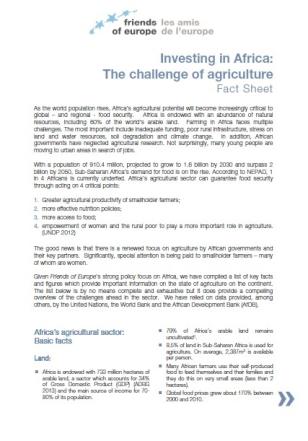Investing in African Agriculture

Investing in African Agriculture
April 2, 2014
Women grow 80-90% of the food in sub-Saharan Africa but own less than 2% of all land. As the world population rises, Africa’s agricultural potential will become increasingly critical to global – and regional - food security. Africa is endowed with an abundance of natural resources, including 60% of the world’s arable land. Farming in Africa faces multiple challenges. The most important include inadequate funding, poor rural infrastructure, stress on land and water resources, soil degradation and climate change. In addition, African governments have neglected agricultural research. Not surprisingly, many young people are moving to urban areas in search of jobs.
With a population of 910.4 million, projected to grow to 1.6 billion by 2030 and surpass 2 billion by 2050, Sub-Saharan Africa’s demand for food is on the rise. According to NEPAD, 1 in 4 Africans is currently underfed. Africa’s agricultural sector can guarantee food security through acting on 4 critical points:
1. Greater agricultural productivity of smallholder farmers;
2. more effective nutrition policies;
3. more access to food;
4. empowerment of women and the rural poor to play a more important role in agriculture.
Based on the recommendations from the Africa Human Development Report 2012, the attached issue brief, prepared by the Friends of Europe, details some of the challenges and opportunities in
Highlights
- 79% of Africa’s arable land remains uncultivated
- 40% of young people in Africa are unemployed
- Changes in agricultural markets are giving rise to new opportunities to smallholder farmers in developing countries, resulting in more incentives to boost their productivity.
- 63% of the total Sub-Saharan population lives in rural areas.
- Women grow 80-90% of the food in sub- Saharan Africa but own less than 2% of all land

 Locations
Locations